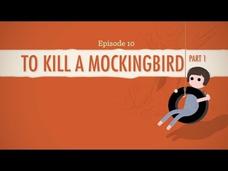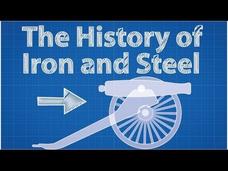MinuteEarth
How to Date A Planet
The earth is literally older than dirt, but how can we prove it? The video explains the methods used to find the age of the moon and the earth. It offers a quick overview of the rock cycle, geologic processes, and the impact of...
PBS
The Last Time the Globe Warmed
Global warming ... greenhouse gases ... climate change ... sounds familiar, right? What about palm trees in Wyoming, or swimming in the sea near Antarctica? Science scholars discover the unbearable conditions Earth experienced during its...
TED-Ed
The History of Tattoos
Did you know that tattoos date back to 8,000 years ago? From Otzi, mummified iceman of the Alps, to high society members of Victorian Britan, discover the cultural significance of tattoos amongst a wide variety...
Lesson Planet
EdTech Tuesday: Wunderlist
Using Wunderlist, you can keep track of all the tasks, to-dos, and moments of inspiration that go along with being a fantastic teacher. Rich and Jennifer offer an overview of using this free app and its primary functions, with real-time...
American Chemical Society
Can I Still Eat This?
The United States sends 133 billion pounds of edible food to landfills every year. A lesson from the ACS Reaction series discusses the chemical reactions that cause food to change over time. Some reactions make food taste different while...
Crash Course
Intro to History of Science: Crash Course History of Science #1
How, and where, did the scientific process as we know it begin? Journey back through time with the introductory video from Crash Course's History of Science series. The resource highlights what people do and don't know about the world,...
Laura Candler
Time Capsule
It's amazing how much kids change from the beginning of the year to the end. Create a written account of their growth with a fun worksheet that involves children recording information about themselves at two points...
TED-Ed
The Fascinating History of Cemeteries
An irreverently illustrated video history of how human societies have honored their dead is both suitable and thought-provoking for high schoolers in the frame of mind to step back from the sadness of death. Scholars...
Curated Video
How Manual Transmission Works
What fun! Get it in gear, reverse time, and speed up the education process with a short, black-and-white film clip that models to a T how a manual transmission works. Although designed for vocational and auto shop classes, the...
Crash Course
How World War I Started: Crash Course World History 209
Why was the assassination of Archduke Franz Ferdinand significant enough to begin the First World War? Crash Course World History provides a video that covers the events of July and August 1914, including the political implications...
GCFGlobal.org
Word: Header and Footers
Even Word documents have heads and feet! The video from the Microsoft Word series is all about headers and footers. Scholars learn how to use preset headers and footers and work within the Design tab. They also discover how to...
SciShow
Quantum Fishing for the Higgs Boson
The scientific models predicted the Higgs Boson for many years before it was proven. Filmed during the search for the Higgs Boson, the video discusses what it would mean for science if researchers proved it wrong. At the time of this...
Physics Girl
5 Amazing Stars We’ve Discovered in Space
Scientists estimate as many as 400 billion stars may exist in our galaxy alone. As part of a larger physics series, an out-of-this-world video introduces five amazing stars. Each star holds the record in something!
Pentatonix
Evolution of Music - Pentatonix
Explore music through the decades with an engaging video brought to you by the 5-part harmony acapella group, Pentatonix. Genuine musical talents sing through a variety of popular music from the 11th century to the 2010's. Artists...
Khan Academy
Introduction to Exponential Decay
Sal goes further into the decay of atoms by introducing the concept of Exponential Decay. He explains that when you have any decaying element, it can be described as the amount of the element present times e to a constant, such as...
Ricochet Science
Isotopes
Altering the subatomic nature of an atom affects its properties. The video illustrates the idea of an isotope using Carbon-12, Carbon-13, and Carbon-14 as examples.
Crash Course
To Kill a Mockingbird, Part I
Harper Lee’s 1961 Pulitzer prize-winning novel To Kill A Mockingbird gets the Crash Course treatment in two short videos. The first quickly summarizes the plot and the conventions of Southern Gothic Fiction before examining what the...
Real Engineering
The History of Iron and Steel
Steel a great resource to teach your class all about iron. Viewers of an engaging video see how the production of wrought iron, cast iron, and steel have changed over time. The video also explains some societal advances due to these...
MinuteEarth
How These Sea Shells Know the Weather in Greenland
Does a single-celled organism know more about the history of our planet than we do? A video explains how single-celled organisms manage to build a house and hold the secrets to the weather. They contain the information about the changes...
The Brain Scoop
Crystal and Her Water Beetles
Water beetles live underwater their entire lives, getting air from a bubble they carry with them. The video, part of an Insect playlist by Brain Scoop, explains how they breathe and why they are fascinating for evolutionary studies. It...
Cisco
Episode 2.3: The Solution
When times get tough, divide and conquer! The third of seven episodes in Global Problem Solver's second season shows the team working toward a solution for displaced pupils and teachers. After dividing into two teams, the Problem Solvers...
Crash Course
The Mind/Brain: Crash Course History of Science #30
The brain is a complex and mysterious organ. The history of brain research dates back to the early asylums where often unethical experiments took place. The narrator of a short video describes these experiments and their discoveries and...
PBS
Native American Heritage Month | All About the Holidays
Watch a quick video to discover why November is Native American Heritage Month. Engaging graphics and eye-catching sound effects detail facts from the origins of the holiday to how we celebrate during the month presently.
Mathispower4u
Graph a Linear Equation in Slope-Intercept Form (Example 3)
The third example's the charm. Young mathematicians watch a helpful video that shows how to graph a linear equation in slope-intercept form on a coordinate plane. The narrator works through the example y = –2x + 5 by first plotting the...























